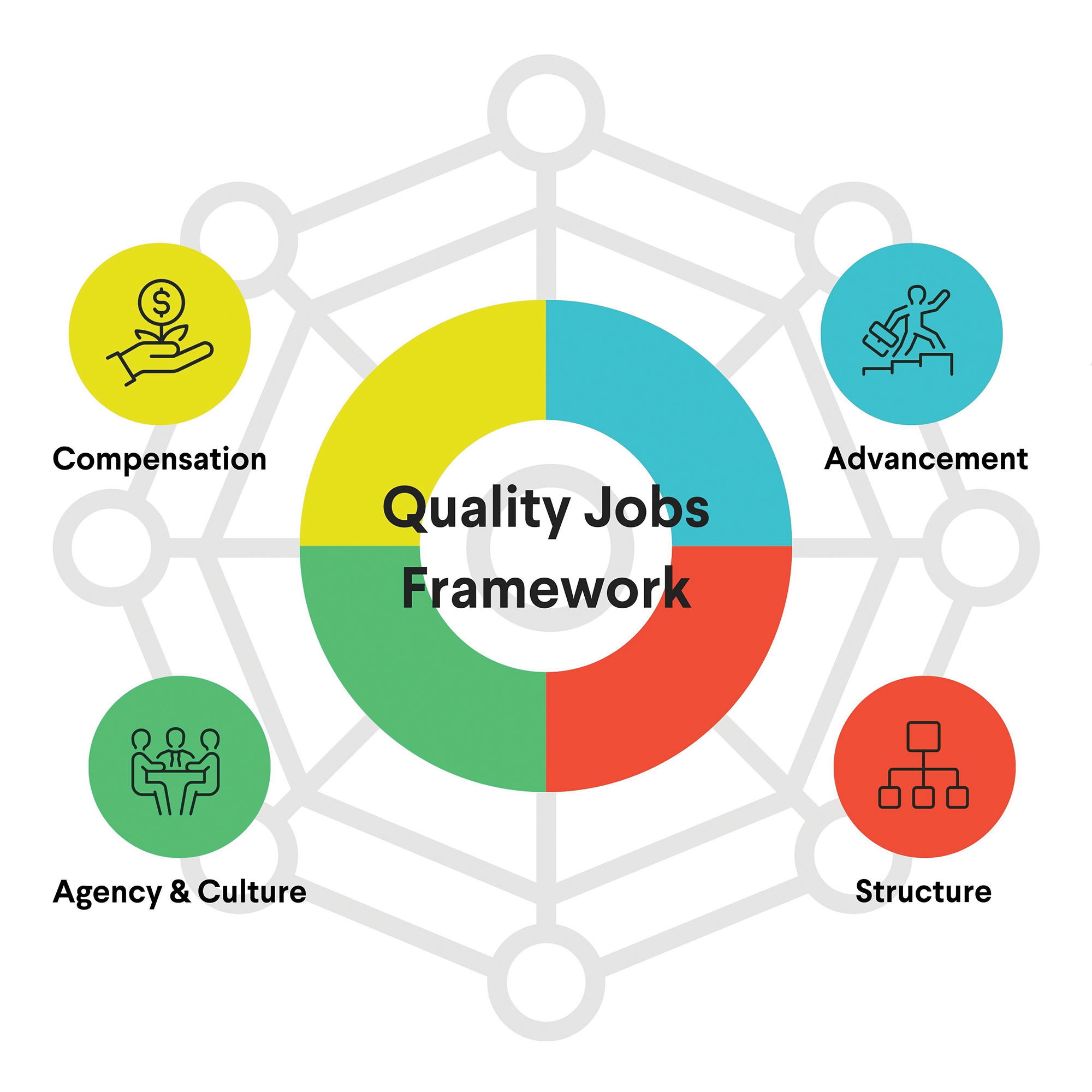
Our North Star: Quality Jobs for 75 Million People
Join us to drive economic success for people, businesses, and communities.

August 28, 2023
JFF’s Quality Jobs Framework outlines actions that can transform employer practices—and the entire learn and work ecosystem—to give all workers what they deserve, beyond just a living wage.
At 3.5%, the low U.S. unemployment rate is cause for celebration this Labor Day. But we can’t lose sight of this sobering reality: More than half of the people in the U.S. labor force—92 million workers—are stuck without quality jobs and face systemic barriers to advancement. We must do better—and, together, we can.
In the past year, we’ve seen a surge in interest in the topic of job quality, driven by widespread concern about enduring labor market dynamics that limit the creation of and access to quality jobs. In response, Jobs for the Future (JFF) has introduced a new version of our Quality Jobs Framework, a blueprint employers can follow to ensure that the jobs they offer are quality jobs. The framework provides a comprehensive definition of quality jobs that goes beyond traditional financial metrics of pay and benefits to offer an aspirational vision of what every worker deserves—flexibility, belonging, autonomy, stability, and pathways to advancement. Moreover, it identifies three drivers of change—public policy, industry-wide practices, and employer practices—that parties throughout the learn and work ecosystem can help activate to turn this aspirational vision of quality jobs into a workplace reality for millions more U.S. workers.
We know achieving that vision won’t be easy. Of the occupations projected to see the fastest growth between 2021 and 2031—including frontline positions in health care and the service and transportation industries—nearly half are of low quality based on compensation levels. And there are far too many jobs with little opportunity for career or economic advancement that employers could make into quality jobs but don’t.
As millions of workers walked away from their jobs . . . a crucial realization emerged: What often matters most about a job—what ‘sticks’—isn’t just the money.
It’s therefore imperative that leaders throughout the learn and work ecosystem push for changes that drive the creation of new quality jobs that are equitably accessible to people of all educational backgrounds and life experiences. That means encouraging policymakers to craft rules and regulations that enforce worker protections, expand access to benefits and higher wages, and create greater flexibility and predictability in jobs. And it means persuading employers and industry leaders to embrace employment standards and adopt workplace policies and practices that transform low-quality jobs into quality jobs.
This much is clear: Employers must provide for their employees’ most basic needs. And that always starts with adopting fair, transparent, and equitable compensation policies, which includes paying all workers a living wage that enables them to comfortably support themselves and their dependents at the local cost of living in their communities.
However, it’s impossible to ignore the lessons and insights revealed amid the economic upheaval of recent years, particularly the disruption caused by the COVID-19 pandemic. As millions of workers walked away from their jobs—citing safety concerns, a lack of empowerment, and the difficulty of maintaining work-life balance—a crucial realization emerged: What often matters most about a job—what “sticks”—isn’t just the money.

For many workers, top priorities also include the other elements we promote in our Quality Jobs Framework—a sense of agency, workplace culture, a healthy and stable environment, and opportunities to build skills and advance in their careers. Many people might assume that those things are commonplace at workplaces today, but the reality is that far too many jobs lack those elements. Putting this updated vision of quality jobs into action will require a systemwide emphasis on policies and practices to enable new workplace supports and programs. Here are some examples:
This work requires a movement. Everyone has a role to play.
Employers, industry leaders, and policymakers and other public officials hold the keys to improving job quality and, consequently, every individual worker’s experience on the job. Using the Quality Jobs Framework as a starting point, here are some key ways leaders in those positions can take action to create and expand quality jobs:
However, relying on employers, business leaders, and public officials to take action alone simply won’t cut it. This work requires a movement. Everyone has a role to play—from training providers and educational institutions to workforce development boards, community-based organizations, and others.
We encourage stakeholders across the learn and work ecosystem to help create the conditions that encourage and, when needed, compel employers to expand access to quality jobs by improving workplace policies and practices. From workforce training programs to employer partnerships, investments, and advocacy efforts—every initiative we undertake represents an opportunity to hold employers, policymakers, and industry leaders accountable and drive meaningful change ourselves to turn our aspirational vision of quality jobs into a reality. We can do this—together.
At JFF, we see the introduction of our revised Quality Jobs Framework as a foundational step toward rallying our partners throughout the learn and work ecosystem to join this movement and, together, achieve our recently announced North Star goal: In 10 years, 75 million people facing systemic barriers to advancement will work in quality jobs.
We envision the framework as a compass that will guide our collective efforts to improve and expand quality jobs and help unlock the potential of an entire ecosystem of influencers, leaders, and champions.
Read the JFF Quality Jobs Framework to learn how you can take action to improve job quality in your community and around the country, and contact us if you’re interested in collaborating and would like us to partner in your efforts.
To receive updates about opportunities to collaborate with JFF and invest in this work as we continue to move quality jobs from theory to action, connect with us on LinkedIn, Twitter (now X), Instagram, or Facebook, or subscribe to our mailing list.

Join us to drive economic success for people, businesses, and communities.

JFF’s framework spells out new standards for quality jobs and actions we can all take to improve job quality—and ultimately help millions more people advance in the economy. How to use this framework: Explore the…

A new survey from Jobs for the Future and Morning Consult highlights worker sentiment on quality jobs. The poll was conducted by Morning Consult on August 12-13, 2023, among a sample of 2,199 adults.…

Prepare your company for the future of work by putting talent first. About Impact Employers Impact Employers take a fundamentally different approach to attracting, developing, and retaining talent—they prioritize the social and economic well-being of…

